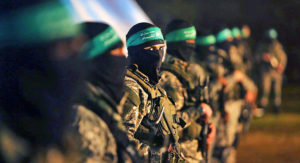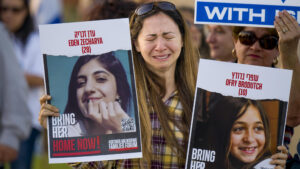While Jews often seem clannish to outsiders, the reality is somewhat different: we have always suffered from a divisive streak of self-destructiveness. As far back as the levelling of the Temple and the expulsion from the homeland, Jewish unity has been undermined by both class divisions and theological disagreements. Two thousand years later, though General Titus’s legions may be forgotten, fissures and infighting remain.
Since October 7, there has been a very real upsurge in antisemitism in Europe and America. Some members of my own synagogue openly discuss whether they should attend services, or events such as menorah lightings; others are considering buying guns.
But despite this shared threat, the response of the Jewish community to events in Israel has been far from homogenous. This is, to some extent, nothing new. Extreme Orthodox Jews have long been a feature of pro-Palestine marches, maintaining that only God can sanction the return of the Jewish state. The equally extreme Black Hebrew Israelites, who maintain they are “the real Jews”, are also avowedly anti-Zionist.
What’s changed, however, is the growing schism inside the Jewish mainstream. Today, the overwhelming majority of American Jews still support Israel, especially among older and more Orthodox demographics. But, according to polling from 2021, less than half of Jews aged 18 to 29 feel emotionally attached to the state. If this new generation has a spirit, it is embodied in Green Party candidate Jill Stein; she may be Jewish, but employs the language of the antisemitic Left, evoking “genocide” and “apartheid” in her denunciations of Israel.
Yet such opposition to Israel goes well beyond the Leftist fringe. Just weeks after the attack, the Union for Reform Judaism (URJ) — leaders of the largest denomination of Jews in North America — called for a humanitarian pause, well before Israel’s offensive forced Hamas to start releasing hostages. It was met with a deserved denunciation by the Orthodox rabbinate, and divided many Reform Jews from their titular leaders.
For almost a decade, this schism has seemed inevitable, with Jewish theology graduates embracing the same “progressive fads” — from gender studies to notions of “colonialism” — that underscore so many of the West’s pro-Palestine movements. And in recent years, Netanyahu’s hard-Right coalitions have only emboldened these anti-Zionist arguments. For instance, a significant portion of liberal and centrist Jews rightfully object to the poor treatment of non-Orthodox Jews, as well as the relentless march of the settlers in the West Bank. For similar reasons, many are also horrified by what they perceive as antisemitism on the Right, whether associated with Elon Musk or those close to Donald Trump. The result is that, during the Netanyahu era, activist rabbis and prominent progressive-leaning Jews such as Peter Beinart have complained that “the Jewish establishment has asked American Jews to check their liberalism at the door”.
Over time, however, Hamas’s massacre and the concurrent rise of antisemitism in Europe and the US seem likely to weaken the case of these anti-Zionist progressive Jews. For while some liberals such as New York magazine’s Jonathan Chait cover the Left’s flank by insisting rising antisemitism is primarily a Right-wing phenomenon, it’s increasingly becoming apparent that Left-leaning institutions — with the university system at its epicentre — share much of the blame. We can see similar currents at play in a number of formerly pro-Jewish groups that now seem more interested in protecting Muslim antisemites than the rights of innocent Jews. Chief among them is the ACLU, which sent a letter to university presidents urging them not to investigate the potential connections between pro-Palestinian student groups and Hamas.
Amid this climate, perhaps the only good news is that the Jewish mainstream seems to be gathering itself and taking action. The Jewish Federations of North America, which represents more than 350 individual communities, have announced a goal of raising $500 million for Israel, with $70 million already in the bank. Even more promising is the way the ultra-Orthodox themselves in Israel are being stirred into action. Despite years of tensions over their exemption from conscription, many are joining the IDF and its support services. Here we can see the waning of one of the great divides in Israeli society — something which, as the Orthodox population grows, will be critical to meeting military needs.
Such unity is critical, as our own history makes clear. The world that saw the Temple destroyed and the people expelled, as Josephus notes, had its roots in conflicts between nationalist zealots, criminal gangs and those, mostly in the upper classes, who simply sought co-existence with Rome. It was only when all was lost that Jews once again saw the value of unity and adherence to tradition, the very things that allowed them to survive these last two millennia.
As was the case in Roman times, and even before, the survival of the community once again requires this sense of purpose. We do not have to love all our allies, but, if the diaspora wishes to survive, we do need to respect them. As the Arab historian Ibn Khaldun wrote in the 14th century: “Only tribes held together by a group feeling can survive in a desert.”
Disclaimer
Some of the posts we share are controversial and we do not necessarily agree with them in the whole extend. Sometimes we agree with the content or part of it but we do not agree with the narration or language. Nevertheless we find them somehow interesting, valuable and/or informative or we share them, because we strongly believe in freedom of speech, free press and journalism. We strongly encourage you to have a critical approach to all the content, do your own research and analysis to build your own opinion.
We would be glad to have your feedback.
Source: UnHerd Read the original article here: https://unherd.com/



